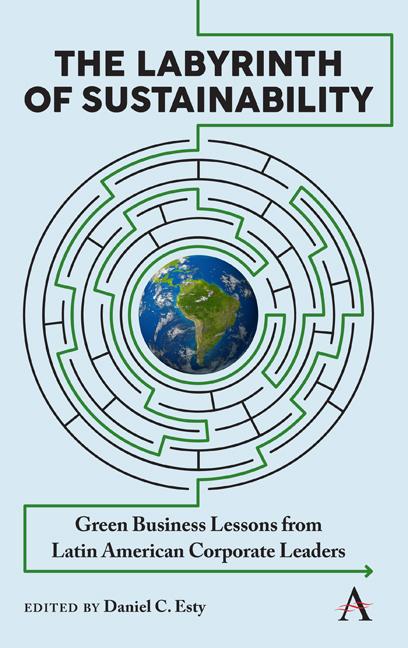Book contents
- Frontmatter
- Dedication
- Contents
- List of Illustrations
- Acknowledgments
- Notes on Contributors
- Introduction
- Chapter 1 Water Conservation in Scarcity Conditions: Corporate Sustainability at Mexico's FEMSA Group
- Chapter 2 Walmart Mexico: Clean Energy to Reduce Costs and Improve Corporate Image
- Chapter 3 Grupo Vanguardia Revitalizes Plastics Recycling in Honduras
- Chapter 4 Nissan Mexicana's Renewable Power Partnership
- Chapter 5 Tecnosol Follows the Sun
- Chapter 6 Rizek Pushes the Dominican Republic Cocoa Industry toward Sustainability
- Chapter 7 Centrosur Leads the Way to Sustainability in Ecuador
- Chapter 8 A Resilient World: Bavaria Builds Its Case on Water
- Chapter 9 Grupo Herdez Takes the Initiative in Mexico's Food Market
- Chapter 10 Chile's Las Palmas Avocado Orchard: Water Consumption Reduction in Agriculture
- Chapter 11 Mabesa: Increasing Global Competitiveness with Eco-friendly Disposable Products
- Chapter 12 Water Use Efficiency Initiatives in Nestlé's Value Chain and the Implications of the Company's Business Model
- Notes
- Index
Chapter 12 - Water Use Efficiency Initiatives in Nestlé's Value Chain and the Implications of the Company's Business Model
Published online by Cambridge University Press: 29 May 2019
- Frontmatter
- Dedication
- Contents
- List of Illustrations
- Acknowledgments
- Notes on Contributors
- Introduction
- Chapter 1 Water Conservation in Scarcity Conditions: Corporate Sustainability at Mexico's FEMSA Group
- Chapter 2 Walmart Mexico: Clean Energy to Reduce Costs and Improve Corporate Image
- Chapter 3 Grupo Vanguardia Revitalizes Plastics Recycling in Honduras
- Chapter 4 Nissan Mexicana's Renewable Power Partnership
- Chapter 5 Tecnosol Follows the Sun
- Chapter 6 Rizek Pushes the Dominican Republic Cocoa Industry toward Sustainability
- Chapter 7 Centrosur Leads the Way to Sustainability in Ecuador
- Chapter 8 A Resilient World: Bavaria Builds Its Case on Water
- Chapter 9 Grupo Herdez Takes the Initiative in Mexico's Food Market
- Chapter 10 Chile's Las Palmas Avocado Orchard: Water Consumption Reduction in Agriculture
- Chapter 11 Mabesa: Increasing Global Competitiveness with Eco-friendly Disposable Products
- Chapter 12 Water Use Efficiency Initiatives in Nestlé's Value Chain and the Implications of the Company's Business Model
- Notes
- Index
Summary
Abstract
Water scarcity is one of today's most pressing global environmental issues, and global water demand is expected to increase by more than half by mid-century. Some multinational corporations are reducing their water footprint, and are discovering that such steps also improve their business model. Nestlé, the world's largest food and beverage corporation, has been widely criticized in the past for environmental and public health failings, but it has begun to address its lapses with its Creating Shared Value sustainability strategy. This case study focuses on the water-use sustainability strategies adopted by Nestlé in Mexico, specifically its Zero-Water powdered milk plant and the efforts of its milk suppliers. It describes the creation of the Zero-Water plant at Nestlé Mexico, and explains the philosophy behind the Creating Shared Value campaign. With a reduction in water consumption from 2,000 cubic meters per day down to zero, the Zero-Water plant provides a model for other multinational corporations to decrease their water use.
Introduction
Founded in 1866 in Switzerland, Nestlé is now the largest food and beverage business in the world, with operations in 150 countries. In 1867, its founder, Henri Nestlé, became concerned about infant mortality rates, and developed a lactic powder for children who could not be breastfed by their mothers. The subsequent research and development for healthy foods based on science has become the core business of this multinational company.
As of 2015, Nestlé had over 300,000 employees worldwide, 436 factories, total global sales equivalent to US$88.5 billion per year, and a yearly net profit of US$9 billion. The company produces and distributes products under various name brands worldwide, including baby foods (Cerelac, Gerber); bottled water (Nestlé Pure Life, Perrier); cereals (Cini Minis, Fitness, Nesquik); candy (Nestlé Crunch, Kit Kat); coffee (Nescafé, Dolce Gusto, Coffee-Mate); frozen food (Maggi, DiGiorno); dairy products (Carnation, Nido); drinks (Nestea, Milo); prepared foods (CHEF, Lean Cuisine); nutrition (Boost, Peptamen); ice cream (Dreyer's, Häagen-Dazs); petcare (Beneful); and weight management products (Optifast). All of these products require water to produce.
Nestlé's newfound leadership role in sustainability is remarkable, given its history of controversy involving baby formula and groundwater depletion.
- Type
- Chapter
- Information
- The Labyrinth of SustainabilityGreen Business Lessons from Latin American Corporate Leaders, pp. 171 - 180Publisher: Anthem PressPrint publication year: 2019



